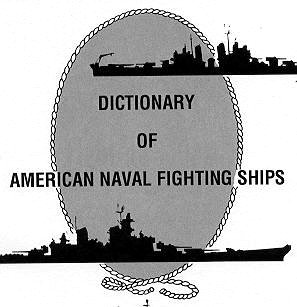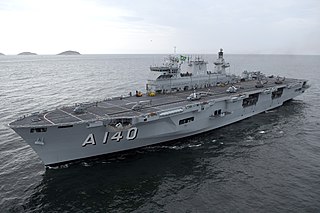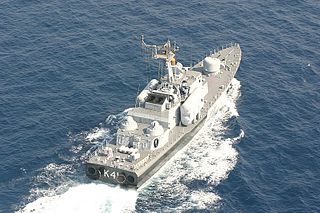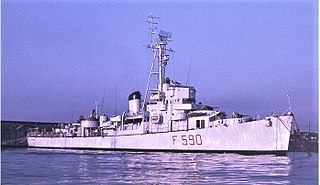Ship commissioning is the act or ceremony of placing a ship in active service and may be regarded as a particular application of the general concepts and practices of project commissioning. The term is most commonly applied to placing a warship in active duty with its country's military forces. The ceremonies involved are often rooted in centuries-old naval tradition.

A corvette is a small warship. It is traditionally the smallest class of vessel considered to be a proper warship. The warship class above the corvette is that of the frigate, while the class below was historically that of the sloop-of-war.

The Dictionary of American Naval Fighting Ships (DANFS) is the official reference work for the basic facts about ships used by the United States Navy.

USS Wadsworth (FFG-9), third ship of the Oliver Hazard Perry class of guided-missile frigates, was named for Commodore Alexander S. Wadsworth (1790–1851). She was the third US Navy ship named Wadsworth. She was the second "short-hull" OHP frigate 445 ft (136 m) long. Commissioned in 1980, she served in the US Navy until 2002. Upon decommissioning she was immediately turned over to the Polish navy, where she now serves as ORP Generał Tadeusz Kościuszko.

The Type 12 or Whitby-class frigates were a six-ship class of anti-submarine frigates of the Royal Navy, which entered service late in the 1950s. They were designed in the early 1950s as first-rate ocean-going convoy escorts, in the light of experience gained during World War II. At this time, the Royal Navy were designing single-role escorts and the Whitbys were designed as fast convoy escorts capable of tackling high-speed submarines. However, this made the Whitbys more expensive and sophisticated to produce in large numbers in the event of a major war, and so the Type 14 "utility" or "second-rate" anti-submarine frigate was developed to complement the Type 12. Although themselves rapidly outdated, the Type 12 proved to be an excellent basis for a series of frigate designs used by the British and Commonwealth navies for the next 20 years.

Landing platform helicopter (LPH) is a term used by some navies to denote a type of amphibious warfare ship designed primarily to operate as a launch and recovery platform for helicopters and other VTOL aircraft. As such, they are considered a type of helicopter carrier.

The Belgian Navy, officially the Naval Component of the Belgian Armed Forces, is the naval service of Belgium.

The Nilgiri-class frigates were updated versions of the Leander class, designed and built for the Indian Navy by Mazagon Dock Limited in Mumbai. Six ships were built between 1972–81. Vessels of the class formed the 14th Frigate Squadron. The lead ship INS Nilgiri was the first major warship to be built in India and was built in collaboration with Yarrow Shipbuilders of the United Kingdom.

The Petya class was the NATO reporting name for a class of light frigates designed in the 1950s and built for the Soviet Navy in the 1960s. The Soviet designation was "Storozhevoi Korabl`" Project 159.

USS Churchill County (LST-583), originally USS LST-583, was an LST-542-class tank landing ship built for the United States Navy during World War II and in commission from 1944 to 1946 and 1960 to 1968. Named for Churchill County, Nevada she was the only U.S. Navy vessel to bear the name.

The USS Duval County (LST-758) was an LST-542-class tank landing ship that was built for the United States Navy during World War II. Named after counties in Florida and Texas, she was the only U.S. naval vessel to bear the name.

USS Harlequin (AM-365) was an Admirable-class minesweeper built for the United States Navy during World War II. She served in the Atlantic during World War II. She was decommissioned in May 1946 and placed in reserve. While she remained in reserve, Harlequin was reclassified as MSF-365 in February 1955 but never reactivated. In October 1962, she was sold to the Mexican Navy and renamed ARM DM-20. From 1976–1978 she was converted to an oceanographic research vessel and renamed ARM Oceanográfico (H02) around the same time. In 1993 she was renamed ARM General Pedro María Anaya (A08). In the late 1990s, she was again renamed, this time to ARM Aldabaran (BE02), as a school ship. As of 2007, Aldebaran remained in active service with the Mexican Navy.

BRP Laguna (LS-501) is an LST-1-class tank landing ship currently under the Philippine Navy. She was transferred to the Philippine Navy on 13 September 1976.

The Abhay-class corvettes of the Indian Navy are the customised variants of the Soviet Pauk-class corvettes. The class was primarily intended for coastal patrol and anti-submarine warfare. The last ship of the class is expected to be decommissioned by 2025.

The Veer-class corvettes of the Indian Navy are a customised Indian variant of the Soviet Tarantul class. They form the 22nd Missile Vessel Squadron.

HMAS Doomba was a Royal Australian Navy (RAN) warship of World War II. Built for the Royal Navy around the end of World War I as the Hunt-class minesweeper HMS Wexford, the ship only saw two years of service before she was decommissioned in 1921 and sold to the Doomba Shipping Company. The vessel was renamed SS Doomba, converted into a passenger ship, and operated in the waters around Brisbane until 1939, when she was requisitioned by the RAN for wartime service. Serving first as an auxiliary minehunter, then an auxiliary anti-submarine vessel, HMAS Doomba was purchased outright by the RAN in 1940, and served until early 1946, when she was sold and converted into a linseed oil lighter. Doomba was scuttled off Dee Why, New South Wales in 1976.

The Aldebaran class was a class of three frigates/corvettes/destroyer escorts operated by the Italian Navy. They entered service in 1951, with the last one being decommissioned in 1976.
This page is based on this
Wikipedia article Text is available under the
CC BY-SA 4.0 license; additional terms may apply.
Images, videos and audio are available under their respective licenses.















